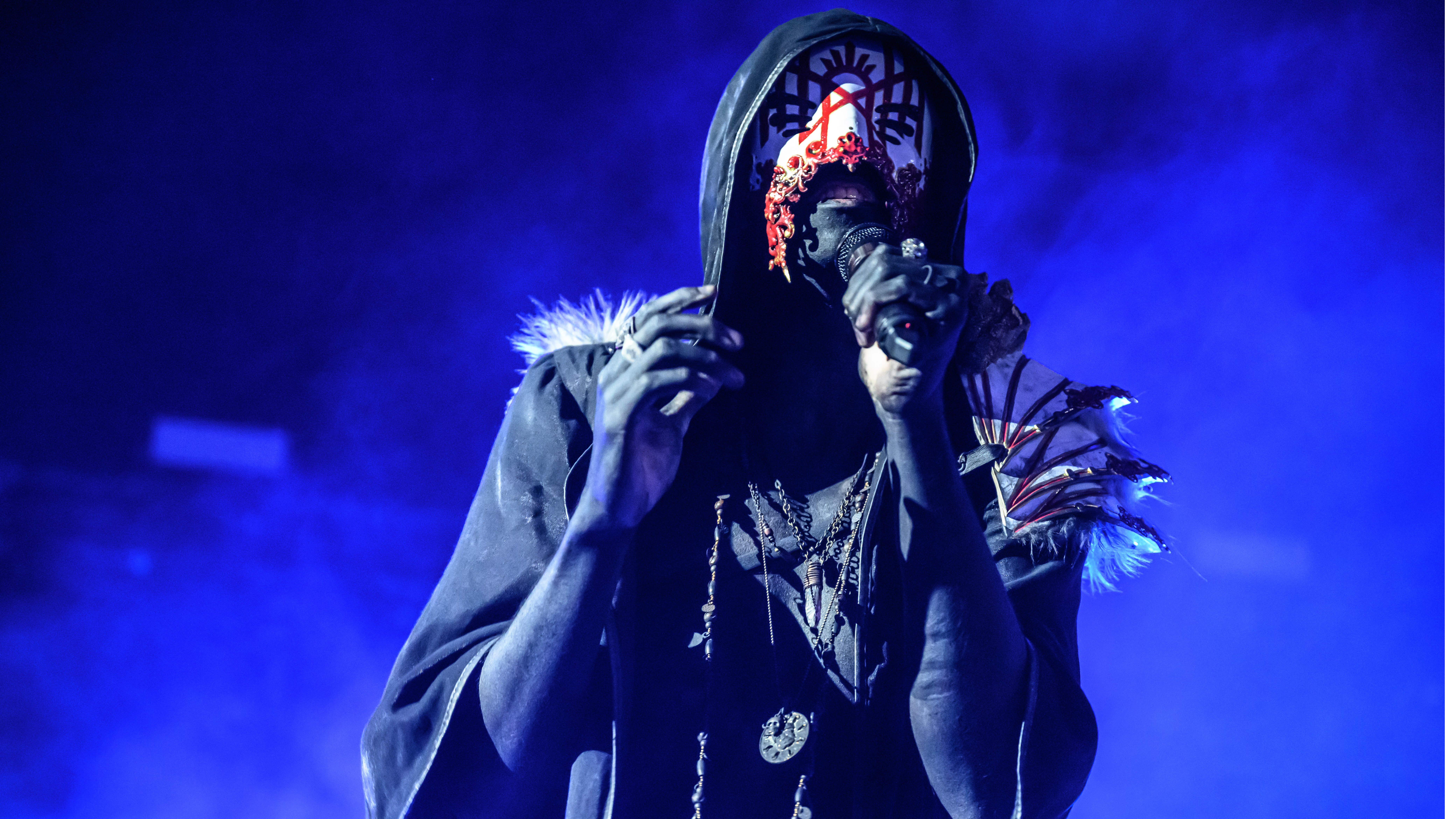“It would be a bit of an ego thing for me to say I made Sleep Token’s world”: Producer George Lever dishes the production secrets of the band’s first two albums and what he really thinks of their latest
Lever explains the two reverbs that became essential for the Sleep Token sound and what’s wrong with the band’s latest

Record producer George Lever, a man synonymous with the creation of the Sleep Token sound and style that’s gone on to huge success, just appeared on The Metal Round-Up podcast and let slip not only what he really feels about the band without his involvement, but some sonic secrets of how he helped build their ‘world’.
Firstly, Lever ponders the odd experience of listening to a new album by a band that he previously worked so closely with.
“I never really understood, where do I stop and where do they begin?” Lever explains. “We were all fairly young in our careers when we started working together. So it was interesting to be on the other side of the glass for the first time.
"To go ‘interesting’… I would have done this… But they’ve not done that. I got to see their true identity on their own – what that looked like.”
Lever goes on to explain the difference between his two albums with the band and the difficult circumstances that may have played a part in him and the band parting ways for albums three and four: “What isn’t really known is that the day we started the second album [This Place Will Become Your Tomb] was the day we went into lockdown. That album, for everyone involved, was difficult. Not a great time for a label to say ‘let’s do it again’. We were at Middle Farm Studios, just locked in.
“There wasn’t really a ‘knowing’ of when it will be done, when it will come out, or what will happen, if there will be shows… I went from spending three months with some of my favourite people in the world, with no days off, for [first album] Sundowning.
"Tomb is not that. And yet it’s the album that everyone seems to have got into Sleep Token with.”
Want all the hottest music and gear news, reviews, deals, features and more, direct to your inbox? Sign up here.
Returning repeatedly to what Lever reckons of their post-Lever work, the producer continues to keep his cards close to his chest, no matter how politely his interrogators push the point, but his furtive eye movements and half-smiles may tell us all we need to know.
“The title track, Even In Arcadia, was where I was ‘I’d really like to have done this one’. It was the most ‘me’ song out of the lot. But I wouldn’t know what I would have changed. But it’s one I would have liked to have done.
“And there’s a group vocal piano part in Look To Windward and I was like ‘yeah, we talked about doing that at one point’. That was cool,” he ponders.
“The reason why [the mixing desks] played such an important role back in the day is because those consoles do have a sound, and the way you run them does affect things,” Lever explains.
“We can just do them more easily in the box now. So having access to things like distortion and soft clipping… Those two things alone change so much with regard to perceived dynamics. And the way that we perceive dynamic information determines how we feel about it.
“These different desks affect volume differently based upon the electronics that are inside them because they change the tonality of what’s being run through them.
"Logic, Pro Tools don’t do this naturally. They have no sound. And then your plugins are your channel strip which determines whether you’re f_____g with it or not. So back in the day, desks made a difference.
“There’s an upper limit. And we’re getting close to it”
“Things are being more distorted now. We are being fed more distorted sounds that are designed for worse playback mediums like earpods and stuff like this,” Lever reckons.
“Things that sound great are rare and hard to come by. The loudness wars didn’t go away. They just got louder. When we were told the loudness wars were happening it was very quiet by comparison. We’re a lot louder now. There will come a point where things stop having emotion because of it ‘cos it will just be pinned.
“There’s an upper limit. And we’re getting close to it. If Sundowning came out now it would be seen as bad. I was very lucky when that got released. I know, for me, I just tend to mix what’s in front of me. I go ‘this sound is this thing, and it needs more of this and less of that’. I’m not going, ‘it must be this shape’. They meant for it to be like that. I’m just helping it along.”
Throughout, Lever proves to be something of an enigma, both eager and able to talk subtle sonic science (that only experts such as he could truly understand) while at the same time playing down the importance of his input.
On the subject of how much he agonizes over his reverbs for example, Lever takes zero credit: “Can I be really honest with you? Sundowning was default setting Valhalla Vintage Verb. That’s just a four-second reverb plugin. That’s it. Default. On. Do I like it? Yeah. Cool.
“And Tomb was a lot of abusing a plugin called Gold Plate by ubk [AKA Kush Audio Gold Plate]. That album is just the sound of that plugin. And that is a three-and-a-half-second-long reverb.
“What I tend to do is I try to find a sound and if I’ve got too much of it I just automate the volume down. I print it and then cut out what I don’t want. Rather than change the plugin setting. The loading up of a reverb plugin and being like ‘yup’… Is purely down to ‘think less - do more’. I’ll figure out how I got it wrong later. It is quite a lot of laziness.”
"I wanted to try to pay homage to the bands that I loved"
Most interesting is the notion of the ‘sonic world’ that Lever played a vital part in constructing for the band – a sound that they have, by and large, taken on board and run with.
“It would be a bit of an ego thing for me to say I made Sleep Token’s world,” Lever admits. “So I’ll just say the things that I had in my mind for what I wanted that world to look like.”
“I introduced them to Health when we were doing Sundowning. I was listening to a lot of Health, Volume 4, over and over. That and Purity Ring. All of Health is great. It’s the same with Code Orange,” Lever reveals.
“My favourite prog band is Porcupine Tree and there is an album that I saw them play in full, live, before I heard it on record – Fear of a Blank Planet – and there’s a really specific part of that album – Anesthetize, at about six minutes in – where there’s a repeating guitar part that plays over and over for way too long…
"If you take that idea where you can repeat a thing and completely throw someone in at the deep end before they realise what’s going to happen next and still be in the middle of something that’s very poignant… It’s juxtaposition.
“A lot of [Sleep Token’s] drum parts were based on Gavin Harrison. We have a shared love of Gavin Harrison. And Higher (from Sundowning) is supposed to be Karnivool-y…?
"For me, I wanted to try to pay homage to the bands that I loved from a technical aspect, but from a world-building point of view… I really don’t know if we knew. It happened anyway.
“It kinda seems to be a world and a space where anything goes. There is still a structure and a rulebook because we know the tropes. But anything goes.”
Daniel Griffiths is a veteran journalist who has worked on some of the biggest entertainment, tech and home brands in the world. He's interviewed countless big names, and covered countless new releases in the fields of music, videogames, movies, tech, gadgets, home improvement, self build, interiors and garden design. He’s the ex-Editor of Future Music and ex-Group Editor-in-Chief of Electronic Musician, Guitarist, Guitar World, Computer Music and more. He renovates property and writes for MusicRadar.com.
You must confirm your public display name before commenting
Please logout and then login again, you will then be prompted to enter your display name.



